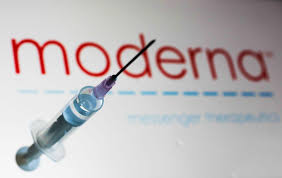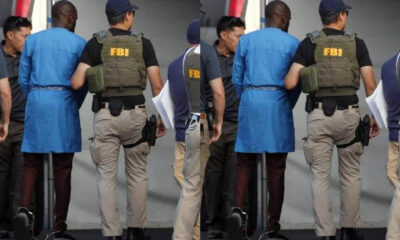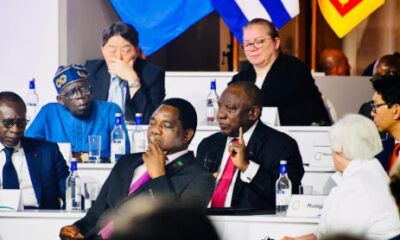News
Another COVID-19 vaccine, Moderna, records 94.5% success

The quest for effective vaccines to combat the ravaging coronavirus has recorded another breakthrough with a United States-based biotech firm, Moderna Inc, saying on Monday that its experimental vaccine was 94.5 per cent effective in preventing the disease, according to an analysis of its clinical trial.
The report from multiple sources including BBC, Reuters and The Guardian comes a week after Pfizer and BioNTech said their vaccine was more than 90 per cent effective.
The results for both vaccines were from interim analyses of large clinical studies.
An interim analysis of the Moderna released on Monday, and based on 95 patients with confirmed COVID-19 infections found the candidate vaccine has an efficacy of 94.5 per cent.
In the result from the Moderna study, there were 30,000 volunteers; half got two doses of the vaccine 28 days apart; half got two shots of a placebo on the same schedule.
There were 95 instances of COVID-19 illness among the study participants — only five of those cases were in the vaccinated group. Ninety were in the group receiving the placebo.
Of these, there were said to be 11 cases of severe disease. The results indicate the vaccine was inducing the kind of immune response that protects people if they were exposed to the coronavirus.
Chief Executive Officer of Moderna, Stéphane Bancel, was quoted as saying in a statement, “This positive interim analysis from our Phase 3 study has given us the first clinical validation that our vaccine can prevent COVID-19 disease, including severe disease.”
Moderna said it had improved the shelf life and stability of its own vaccine, meaning that it can be stored at standard refrigeration temperatures of 2C to 8C for 30 days.
The company said it planned to apply to the US regulator, the Food and Drug Administration, for emergency-use authorisation in the coming weeks.
The results are the latest encouraging news to emerge from the breakneck effort to develop a vaccine against coronavirus and follow a similar interim analysis earlier this month from a collaboration between Pfizer and the German firm BioNTech, which suggest its vaccine is 90 per cent effective at preventing illness.
The Moderna vaccine is however not expected to be available outside the US until next year.
The biotech company said it would have 20m doses ready to ship in the US before the end of 2020 and hoped to manufacture 500 million to one billion doses globally next year.
So far, the UK does not stand to benefit from the vaccine. Moderna has agreed to provide the US with 100 million doses, with an option to buy 400m more. Japan, Canada, Switzerland, Qatar and Israel have also signed agreements, and the European commission has a “potential purchase agreement” for 80m-160m doses. The UK chose not to participate in the EU vaccine purchase scheme, with the health secretary, Matt Hancock, arguing in July that the government could source vaccine faster on its own. However, a Whitehall source said the UK government was in “advanced discussions” to procure doses of the Moderna vaccine.
The Moderna vaccine, which is based on similar mRNA technology as BioNTech’s, is expected to be assessed by the FDA on a final analysis of 151 COVID cases among trial participants who will be followed on average for more than two months.
If the results remain as impressive as the trial goes on, the Moderna vaccine could potentially provide a major advantage over the Pfizer vaccine.
While Pfizer’s vaccine requires ultracold freezing between -70C and -80C from production facility to patient, Moderna said it had improved the shelf life and stability of its own vaccine, meaning that it can be stored at standard refrigeration temperatures of 2C to 8C for 30 days.
It could be stored for six months at -20C for shipping and long-term storage, the company said.
Cost and side effects
At £38 to £45 for a course of two shots, Moderna’s vaccine is more expensive than the other frontrunners. AstraZeneca and Oxford University are aiming to sell their vaccine at about £3 a dose, while vaccines in trial with Johnson and Johnson and collaboration between Sanofi and GSK are both expected to cost about £8 a dose.
Pfizer is charging the US about £30 for a two-shot course. The UK has ordered 40 million Pfizer shots but none of the Moderna vaccine.
Moderna’s two-shot vaccine injects genetic material called mRNA into the body, which cells then use to churn out the spike protein the virus uses to invade cells.
The spike protein covers the surface of the virus and is one of the main targets of the body’s immune response to wipe out the infection.
A question mark that remains over the Pfizer vaccine is whether it prevents serious illness.
The Moderna results, released by an independent data safety monitoring board, are encouraging on this point. Of 11 participants who developed severe COVID while on the trial, all were in the placebo group. The results also suggest the vaccine is effective in older people and those from diverse ethnic backgrounds.
Moderna’s interim analysis includes a safety review of data available so far.
The company said it had found no significant safety concerns, with most reactions being mild to moderate and short-lived.
Among the side effects reported is the injection site pain in 2.7 per cent of trial volunteers after the first jab.
After the second, the most significant side effects include fatigue in 9.7 per cent, muscle pain in nine per cent and joint pain in five per cent. Others had headaches; others pains, or redness at the injection site.
Peter Openshaw, professor of experimental medicine at Imperial College, London, said the Moderna results were “tremendously exciting” and boosted optimism that a choice of good COVID vaccines would be available in the next few months.
News
Nigeria Customs Service begins 2025 recruitment [How to apply]

Nigeria Customs Service begins 2025 recruitment [How to apply]
The Nigeria Customs Service (NCS) has announced the commencement of its recruitment exercise, assuring Nigerians that the process is entirely free and fair.
The agency has cautioned the public to be vigilant against scammers who may attempt to exploit unsuspecting applicants during the recruitment period.
Applications are invited for positions in the Superintendent, Inspector, and Customs Assistant cadres as part of the Service’s plan to recruit 3,927 officers in 2025.
This initiative is aimed at enhancing trade facilitation and supporting Nigeria’s economic recovery efforts.
“Our recruitment is entirely free and fair. At no stage do we charge fees. Anyone requesting payment is a scammer,” the agency emphasized, urging applicants to be wary of fraudulent schemes.
READ ALSO:
- Dangote, Tinubu, Lookman, Badenoch named among 100 most influential Africans in 2024
- Heavy security in Ilesa as ex-Osun deputy gov emerges new Owa-Obokun
- Hacker has stolen N180m from my NGO account – VeryDarkMan cries out
The NCS outlined eligibility criteria, stating that applicants must be Nigerian citizens by birth, possess a valid National Identification Number (NIN), and have no criminal record or ongoing investigations.
Academic qualifications for the three cadres are as follows:
Superintendent Cadre: A university degree or Higher National Diploma (HND) along with an NYSC discharge or exemption certificate.
Inspectorate Cadre: A National Diploma (ND) or Nigeria Certificate in Education (NCE) from an accredited institution.
Customs Assistant Cadre: At least an O’Level certificate (WAEC or NECO).
In addition to these qualifications, the NCS stressed that all applicants must be physically and mentally fit, providing evidence of medical fitness from a recognized government hospital.
Nigeria Customs Service begins 2025 recruitment [How to apply]
News
Tinubu to critics: I won’t reduce my cabinet size

Tinubu to critics: I won’t reduce my cabinet size
President Bola Tinubu on Monday unequivocally responded to critics who described his cabinet as “bloated” by saying he is unprepared to reduce the size of his 48-man cabinet.
“I am not ready to shrink” the size of my cabinet, Tinubu said during a media chat at his Bourdillon residence in the highbrow Ikoyi area of Lagos State.
“I am not prepared to bring down the size of my cabinet,” the former Lagos governor said, arguing that “efficiency” has been at the core of his selection of ministers.
The president also said he has no regret removing the petrol subsidy in May 2023, saying Nigeria cannot continue to be Father Christmas to neighbouring countries.
READ ALSO:
- Kolawole Erinle: Appeal court affirms sentence for ex-convict over $1.4m fraud
- We’ve forced Lakurawa terrorists back to Mali, says FG
- Petrol: MRS enforces N935 per litre nationwide
“I don’t have any regrets whatsoever in removing petrol subsidy. We are spending our future, we were just deceiving ourselves, that reform was necessary,” he told reporters.
Tinubu appointed 48 ministers in August 2023, three months after his inauguration. The Senate immediately screened and confirmed the ministers. One of the ministers, Betta Edu, was suspended in January while another, Simon Lalong, moved to the Senate.
There were calls for the President to reshuffle his cabinet as many Nigerians have not been impressed by the performance of some of the ministers, especially in the face of unprecedented inflation, excruciating economic situation and rising insecurity.
In October 2024, Tinubu re-assigned 10 ministers to new ministerial portfolios and appointed seven new ministers for Senate confirmation. He also sacked five of his ministers but critics insist that the President’s cabinet remains large, especially with the creation of a Livestock Ministry with a minister.
Tinubu to critics: I won’t reduce my cabinet size
News
Tinubu: Food stampede incidents, grave error

Tinubu: Food stampede incidents, grave error
..Don’t publicise gifts distribution if you don’t have enough
President Bola Tinubu has described the recent three stampede incidents during distribution of relief materials to children and others as a grave error.
He told people to be more organised and stay away from giving palliative or publicity of the giving if they had insufficient materials.
He stated this during his first presidential media chat on Monday.
The President said he had been sharing palliatives in his Lagos residence for 25 years without any incident and blamed the recent food stampedes in the country on poor organisation.
A total of 35 children died on December 18 during a stampede that happened at a funfair event in Ibadan, Oyo State.
10 people, including children, also died on December 21 in another stampede at the Holy Trinity Catholic Church in the Maitama district of Abuja during the distribution of palliatives.
Another 22 people were reported dead during a rice distribution event at Amaranta Stadium in Ojika, Ihiala LGA, on the same day.
“It’s unfortunate and very sad, but we will continue to learn from our mistakes. I see this as a grave error on the part of the organisers,” he said.
But the President insisted that the incidents should not dampen the “happiness of the season”.
“It is very sad that people are not well organised. We just have to be more disciplined in our society. Condolences to those who lost members, but it is good to give,” Tinubu said.
“I’ve been giving out foodstuff and commodities, including envelopes in Bourdillon, for the last 25 years, and I’ve never experienced this kind of incident because we are organised and disciplined.
“If you know you won’t have enough to give, don’t attempt to give or publicise it.”
The President compared the situation to food banks in countries such as the United States of America (USA) and Britain, noting their structured approach.
“Every society, even in America, has food banks. They have hungry people. In Britain, they have food banks and warehouses, and they are organised. They take turns m lining up and collect,” he added.
-

 metro3 days ago
metro3 days agoINTERPOL declares 14 Nigerians wanted for drug, human trafficking
-

 Business3 days ago
Business3 days agoNNPCL launches production monitoring centre
-

 metro2 days ago
metro2 days agoJigawa State governor loses son 24 hours after mother’s death
-

 Business2 days ago
Business2 days agoBe creative, monarch, others challenge Muslim professionals on economic revival
-

 metro3 days ago
metro3 days agoIbadan stampede: She was treated like a terrorist, Queen Naomi’s sister says about her condition
-

 Entertainment1 day ago
Entertainment1 day agoMultiChoice announces free access to all DSTV channels for 3 days
-

 Auto20 hours ago
Auto20 hours agoLSM MD extols founder’s qualities after latter posthumous industry award
-

 metro18 hours ago
metro18 hours agoHeavy security in Ilesa as ex-Osun deputy gov emerges new Owa-Obokun














You must be logged in to post a comment Login